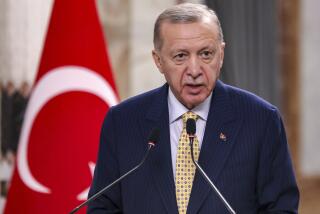10 Nations Form a Muslim, Europe-Asia Economic Bloc
- Share via
ISLAMABAD, Pakistan — Five former Soviet republics and Afghanistan joined Iran, Pakistan and Turkey on Saturday to create a huge Muslim economic bloc linking Europe and Asia.
“Today the aspirations of 300 million people who share a common heritage and culture have been realized,” Pakistani Prime Minister Nawaz Sharif said after the signing ceremony.
Foreign ministers of Kazakhstan, Azerbaijan, Kyrgyzstan, Turkmenistan, Uzbekistan and Afghanistan signed the founding charter of the Economic Cooperation Organization (ECO), forming the biggest economic bloc after the European Community.
The Treaty of Izmir was amended to expand ECO membership from three--Iran, Pakistan and Turkey--to 10.
Tajikistan, already accepted as a member, did not sign because domestic upheaval prevented its representative from attending.
Oil-rich Kazakhstan, which stretches from China to the Urals, was a late applicant for membership Friday; it previously sought observer status while considering seeking entry to the EC.
Iranian Foreign Minister Ali Akbar Velayati said he hoped the expanded body would lead to an Islamic common market, and he proposed the further slashing of tariffs, creation of an ECO airline and establishment of satellite links.
Sharif dismissed fears that an enlarged ECO, embracing 25% of the world’s Muslims, would emerge as an Islamic bloc.
ECO Secretary General Shamshed Ahmed has described ECO as a bloc that happens to be Muslim but not an alliance of Islamic interests.
“Our organization now corresponds to the boundaries of the ancient region which brought prosperity and civilization to its people through fruitful exchanges along the historic Silk Route,” Sharif said.
The ECO has the potential to become one of the major cooperative endeavors in the contemporary world, he said. It was founded more than 25 years ago but became effectively defunct with the 1979 Iranian revolution.
It was revived in 1985 but remained a slow-moving body until the collapse of the Soviet Union prompted its three members to seek opportunities for trade and influence in Central Asia.
More to Read
Sign up for Essential California
The most important California stories and recommendations in your inbox every morning.
You may occasionally receive promotional content from the Los Angeles Times.













